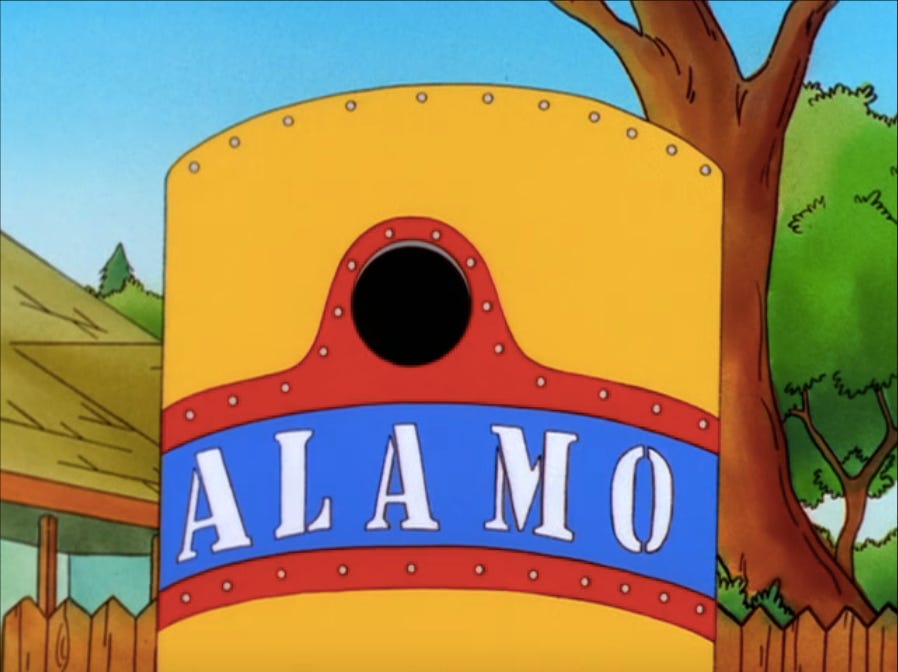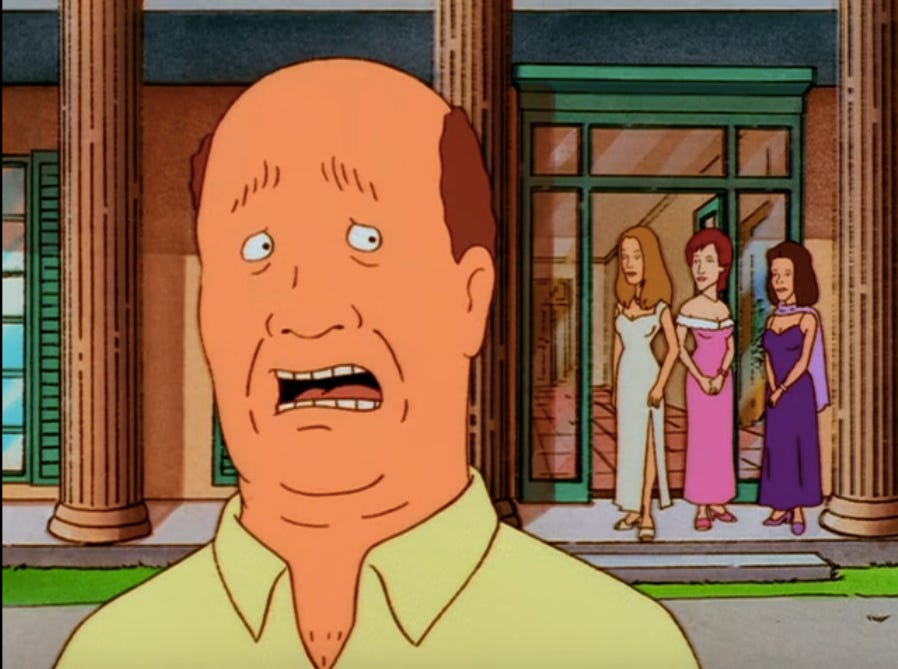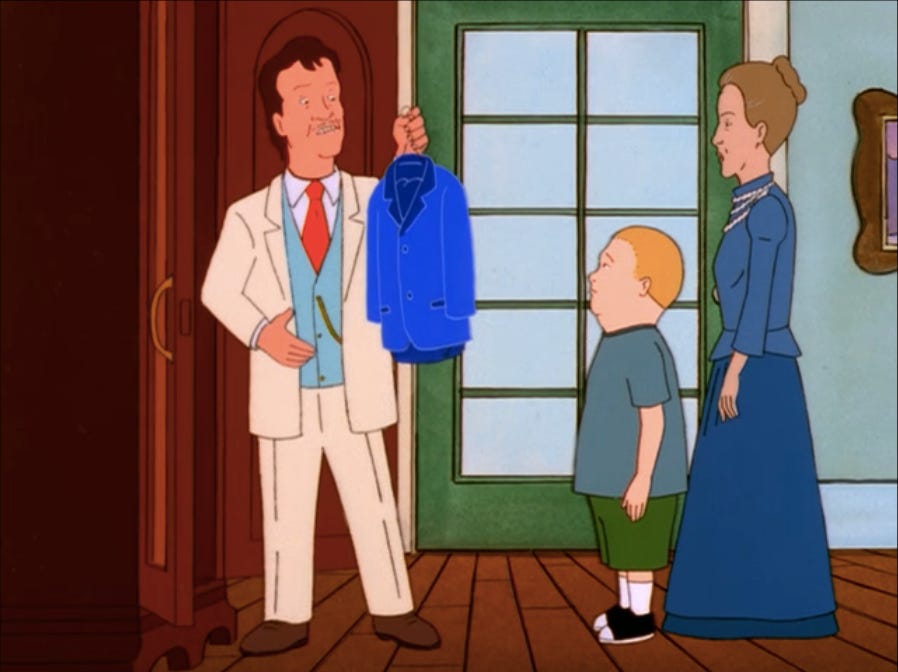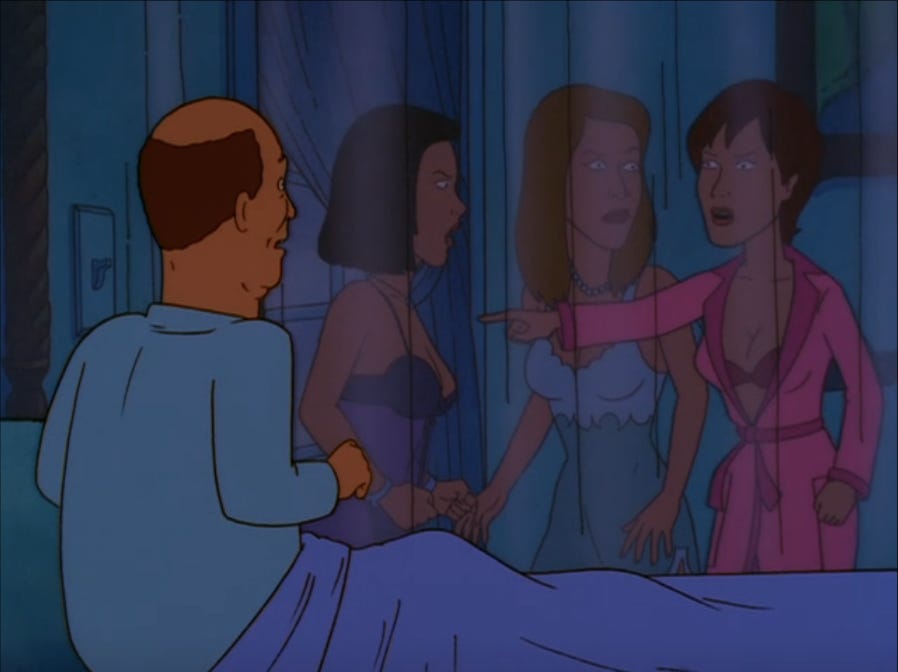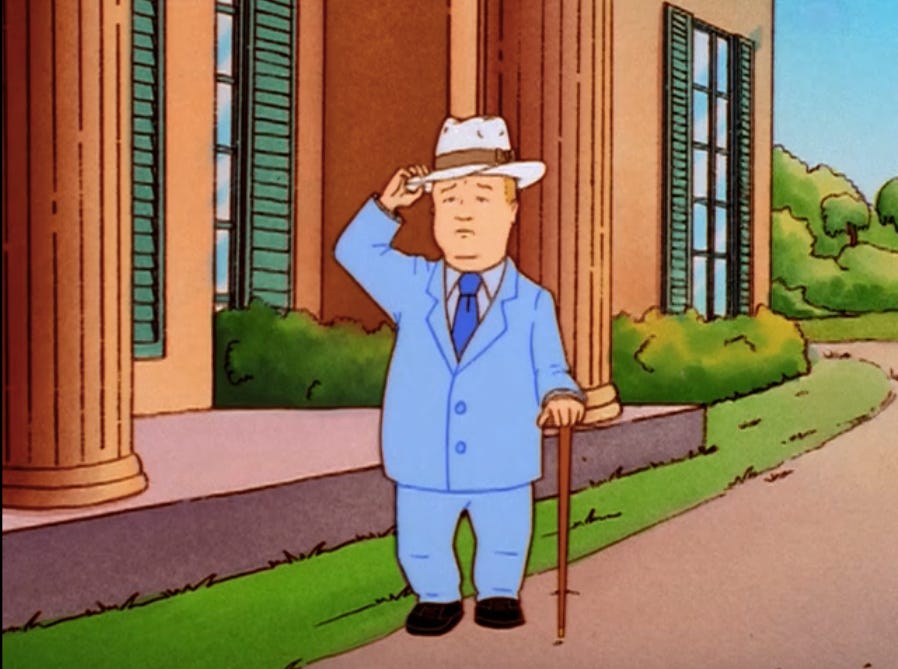King of the Kapital
A Gothic-Feminist-Marxist reading of the King of the Hill episode “A Beer Can Named Desire.” A Satire.
Welcome to Southern Gothic Week. Every day this week, I’ll be publishing essays that cover a range of topics related to the American South. This is the penultimate post in the series — tune in tomorrow for the grand finale.
Oh, Bobby Hill, my sweet, sweet failson, my most special boy, God as my witness you will inherit the earth and her spoils. This Halberstamian failure — queer in nature — is the sulfur-tipped head that brushes against the tinderbox of society and with your failures come revolutions beyond our wildest dreams. And where is this dream? Well, in the fourth season, with A Beer Can Named Desire, of course.
We begin with desire — or, in this case, desire deferred. Hank, Dale, Bill and Boomhauer, our potential heroes of the proletariat, are in their hallowed suburban respite, the alley, beers in hand. Only today, the beers not only represent a piece of cultural iconography — signifying their Texan, working-class bonafides — but as a symbol of the American Dream itself.
Dale downs his beer and the bottom of the can cordially informs him, “Sorry Please Drink Another Beer,” as we will soon learn this act of conspicuous consumption is in service of a contest by the beer company in which the winner gets a shot at a million dollars by throwing a football into a giant beer can at a New Orleans Saints game.
“Sorry Please Drink Another Beer,” becomes a refrain in the scene as the empties pile up on the lawn like dead soldiers in the war for turning what was once an act of leisure into yet another form of exploitation.
“Imagine Hank,” Bill, the town fool, muses, “a trip to New Orleans.” Oh, believe me, Bill, I do. New Orleans is, as Dale says later, “the most corrupt city on Earth,” and it’s my absolute favorite. It’s also an American anomaly with a mix of cultures — from French Creole to Catholic — as potent as the cocktails it birthed, that conjures the dreams and fantasies integral to this episode.
The scene ends with Hank unable to finish his beer but unwilling to waste the cherished liquid — and what it represents to him — within, or as he says in a simulacrum of commodity fetishism, “I have never poured out beer. Even to put out a grass fire.”
This is, of course, the winning can, though we won’t know that until Luanne, Hank’s stereotypical “white trash” niece, finishes it instead of him. When she tries to assert her win, Hank, wounded by having his hours of labor devalued, tells her if she, a 19-year-old, tries to claim her prize, she’ll be arrested, using the threat of America’s overreaching, aggressive carceral system as a tool in his reification of patriarchal power.
Now, there’s a Faustian twist to this contest I haven’t mentioned. The winner can either go for the $1 million by throwing the ball himself, or he can allow former Dallas Cowboys player Don Meredith to throw it for him to win $100,000. But here we have a threat to Hank’s received sense of masculinity. Ipso facto, he’ll go for the throw himself to win the higher pot but — more importantly — to resist the symbolic castration of having another man provide for his family.
In preparation for his victory march on Louisiana, Hank constructs a giant beer can to practice the toss, making the phallic symbol of his bourgeois desire manifest. Hank dreams of things greater than money: glory, respect, value. While practicing, his friends all but invite themselves on the trip, with Bill asking if they can stop to see his family in Louisiana, surprising the other men who, in the grand tradition of heteronormative male bonding, have shared little about their interior lives with each other. Dale confirms as much when he says, “Bill, I didn’t know you grew up in Cajun Country,” before adding, like the Libertarian king he is: “And I don’t care.”
Once in Louisiana, Bill peels back even more layers of his identity to his apathetic social milieu, or as Peggy says, “Bill, I had no idea that you spoke Cajun. Perhaps that’s because I try not to ask you questions.” He not only speaks fluent Cajun, but his extended family lives in a luxurious plantation home. On arrival, they’re greeted by his colorful Southern brood, which includes three attractive, eligible bachelorettes, each a widow despite her young age and all immediately interested in courting Bill — or, rather, his surname. They’re each seeking the legitimacy marriage and childrearing would bring them and, specifically, of being able to carry on the Dauterive name, as Bill is the last living male able, or willing, to produce an heir. This reveals the patriarchal trap that constitutes these women’s lives as well as the scarcity mindset that locks them in a contrived competition with each other as they fight to be the one to secure the bloodline.
But here’s the rub: two of the women are the widows of Bill’s cousins, while one is herself his blood relative. Bill’s mission then becomes to figure out which is his cousin so that he can happily fuck the other two, uninhibited by the incest trope that plagues the Southern Gothic genre. In one scene, Peggy warns against this:
“Listen to me, two of these women are widows of the dead Dauterive sons. They are only related by marriage, so they are in play. But one of them is your flesh-and-blood cousin. She is your ticket to hell. … So, just to be safe, keep your hands off all three.”
As Arlen’s leading liberal op, Peggy’s role is to always confuse, diffuse and deflect those around her from ever reaching any type of real consciousness. Like any true white feminist, Peggy enjoys the domestic, middle-class comforts patriarchy has bestowed upon her in return for her freedom to ever commit to any real liberatory action. But, Bill has to inquire further, as this will force society’s patriarchal contradictions to light, which is the only to acknowledge and abolish them.
Also in attendance is Bill’s gay cousin, Gilbert, who flickers through the scenes dropping wry bon mots, embodying the savoir faire of certain Southern gentlemen. Gilbert’s purple speech clashes with Hank’s straightforward sensibilities in that as a queer man in a repressive society, he’s had to learn how to say things without saying them, sans the freedom of expression, freedom without worry, freedom from code-switching afforded to Hank.
Gilbert also takes a liking to Bobby, guiding him in the ways of, in his word’s, a gentleman. “Robert, this here is velvet, not velveteen. A gentleman must learn the difference.”
This, of course, is abhorrent to Hank, who views this kind of mentorship from a queer elder to the younger generation as an act of aggression on his telegraphed conservative values. But, here, Bobby, our beautiful, beautiful boy, embodies an important expression of human relationships and cultural inheritance outside of the nuclear family unit. Gilbert is not only sharing cultural customs, he’s passing down knowledge so that it may continue to thrive in future generations. Here, they relate to each other human to human, slipping easily into a shared patois of joie d’vivre, doing away with the artificial desires mediated to them by the heteronormative monoculture.
Let’s consider, for a moment, the namesake of this half-hour of television. Tennessee William’s “A Streetcar Named Desire” concerns the flight of a disgraced Southern belle from her small Mississippi town to her sister’s New Orleans apartment. Blanche DuBois is a haunted woman with a shady past and loose grip on the truth. She spends the play in conflict with how she believes life to be and how it actually is, before finally falling victim to fantasy in a mental breakdown that leaves her in a hospital. Shot through with Williams’ common themes of sex and death and gender roles, “Streetcar” is about the valley between fantasy (that named desire) and reality. It can’t be all one or the other — the vision of what could be with the acknowledgment of how things are is the only path to change.
This echoes through Hank’s own path to his dreams of glory and a windfall of money. But this is a farce. Hank will never find what he truly needs to live a free and fulfilling life playing by the rules of a game rigged by those controlling the levers of power. The master’s tools will never dismantle the master’s house, after all.
The party — minus Bill who stays behind for his incestuous sexual survey — is off to New Orleans for the big event. To keep it brief, Hank only finds trouble in the Big Easy. Once he’s on the field with a full stadium of eyes on him, he decides at the last second to go for “the sure thing” and lets Dandy Don Meredith make the throw for him. The Sure Thing, much like the American Dream, however, is a myth. Dandy Don misses the throw and, much to Hank’s consternation, doesn’t even remove his winter coat before shooting his shot. Instead of accepting this defeat, Hank rages against the machinery of power that promised him the warmth of the hearth but ultimately left him cold. But specifically in this case, that’s Dandy Don Meredith, whom he rages against with a full-body tackle out on the field.
However, in the episode’s denouement, Hank and Dandy Don return to the field where Hank proves he could have made the throw, sinking a football into the giant beer phallus only this time in an empty, quiet stadium. Or, as Hank quietly laments, “It’s not the same. There’s no fans in the stands. There’s no pressure. And I didn’t win a million dollars.”
He also reconciles with Dandy Don, as the two men bond over their shared exploitation and abandonment under a cruel capitalist system, realizing they have more in common with each other than with the capitalist class. However, we’ve reached the end of our 30 allotted minutes before they can foment any true revolution.
Back on the Bayou, Bill learns which of the three women is his blood relative and, we come to find out, he does end up bedding the two who are not, though the act does not lead to procreation, thereby delegitimizing the patrilineal power structure that has damned these women to half-lived lives haunting his ancestral home. We never find out what happens to any of these women past the episode’s diegesis but we can only hope that in exposing the internal contradictions of the oppression they exist within, he’s freed them, if only a little.
The interlocking matrices of oppression will continue to ravage the world of King of the Hill. Despite their best dialectal efforts, none of our protagonists were moved to any real class consciousness in these 30 minutes of their lives, and while coming to certain understandings or even contemplating certain problems spurred by conflict, the material conditions that led to these conflicts in the first place continue on — for now.
Because while episodic, bourgeois and steeped in Southern conservatism on the surface, King of the Hill is ultimately about the clash between past and present, about the liminal, about the in-betweens — tradition vs modernity, right vs wrong, virtue signaling vs actual commitment to change — that will ultimately lead us into a better future. Hank Hill has become a sort of mouthpiece for our frustration with the incessant micro-aggressions — from requiring an app every time you want to engage with a business to QR code menus — that have become a hallmark of modern life.
But, even with his traditionalist ideology, he’s constantly being challenged by the people in his life, and, at the end of the day, he values respect, reason and the common good above all. Hank’s a never-Trump Republican. Put Hank Hill in a room with Bernie Sanders for an hour and he’ll come out a comrade. As Luanne says in the episode where she briefly becomes a Communist, when Hank says he hates the party because all they do is boss people around: “Sounds like you, Uncle Hank.”
But, of course, the greatest gift he’s bestowed upon the future is his working-class heir apparent, our sweet prince, the people’s princess, Bobby Hill. In his live-and-let-live attitude, creativity, whimsy and leisurely pursuits, Bobby mirrors everything we could want of the next generation. If there’s one lesson to be gleaned from the actions, revolutionary or not, of the residents of Arlen, it’s that the Bobby Hills of the world will inherit the earth.
Previously on Southern Gothic Week
Our Southern Gothic
The South is a thing I feel when I can’t feel anything at all.
How I Learned to Stop Worrying and Love the Redneck
Or, the rise of a new working-class hero.
Somewhere in a Forest
Eco-horror and resistance in the modern South.







